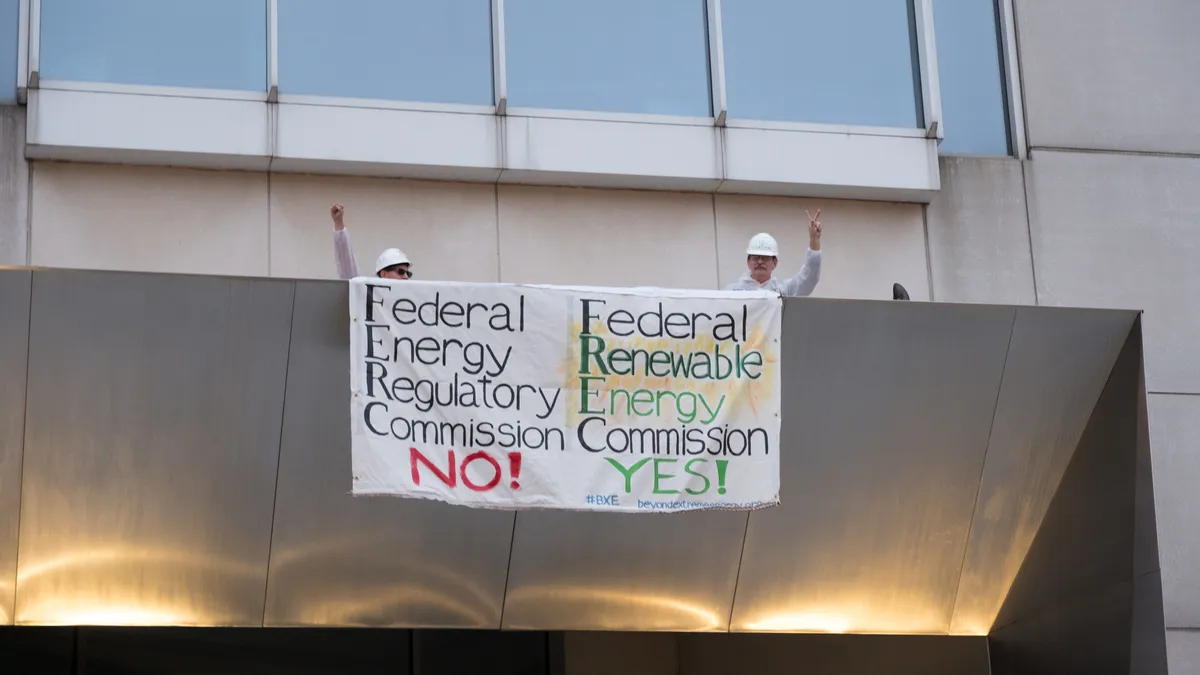Dive Brief:
- Democratic senators last week filed amendments on the comprehensive American Energy Innovation Act that would have prevented the Federal Energy Regulatory Commission from carrying out its controversial Minimum Offer Price Rule (MOPR) orders and mandated a more politically balanced commission.
- A third amendment would have prevented the federal body from delaying rehearing requests indefinitely. Though none of the three amendments were adopted in the modified substitute bill filed on Thursday by Sen. Lisa Murkowski, R-Alaska, observers say their introduction shows growing Congressional worry about FERC's role in advancing or slowing down clean energy adoption in wholesale power markets, worries that could be raised again in the House.
- "Congress is concerned about barriers to the participation of advanced energy technologies in these markets, and also concerned, I think, about the balance of state policies and federal regulation of the wholesale markets," Managing Director and General Counsel at Advanced Energy Economy Jeff Dennis told Utility Dive. "I think the fact that we saw ... amendments on that introduced was pretty significant."
Dive Insight:
Of the hundreds of amendments introduced by the Senate since the legislative package was first unveiled Feb. 28, only 18 made it into the modified version filed by Senate Energy and Natural Resources Chair Murkowski last week.
But the FERC amendments, introduced by four Democratic senators, indicate several growing frustrations around the actions of federal energy regulators, said Dennis.
The first order would effectively prevent FERC from carrying out its controversial MOPR orders in the PJM Interconnection and the New York Independent System Operator. Under those decisions, FERC effectively raised the bids of subsidized resources selling their power into the PJM to prevent market distortion, and narrowed exemptions of buyer-side mitigation rules in NYISO. Critics, including some members of Congress, say those rules favor baseload resources such as coal and natural gas, while limiting the ability of clean energy technologies to compete.
FERC's PJM decision "undermines the state efforts by forcing renewable power to charge higher prices than they otherwise would even capacity markets, causing that power not to clear and completely undermining the economics of future renewable energy development," Sen. Chris Van Hollen, D-Md., said last week during the American Council on Renewable Energy's annual policy forum. "We have a FERC that's taking us, at the national level, in the exact opposite direction of what we need to do."
Van Hollen was one of the bills' sponsors along with Sens. Kirsten Gillibrand, D-N.Y., Bob Casey, D-Pa., and Ben Cardin, D-Md. The senators' offices did not respond to requests for comment by time of publication.
The other amendments also addressed two outstanding issues stakeholders have raised: lengthy litigation delays and an increasingly partisan FERC.
Under the Federal Power Act, FERC is able to delay rehearing requests indefinitely, creating a "purgatory" of backlogged litigation, particularly as stakeholder concerns grow around the MOPR, according to a former state regulator.
The MOPR-related amendments in particular "are more aggressive proposals to sort of derail FERC orders than I've seen in the past," said Dennis. And Democrats are also growing increasingly frustrated by a Republican-dominated FERC.
After losing Democrat-appointed Commissioner Cheryl LaFleur in August, the commission was left with a 2-1 Republican-appointee majority, soon to be 3-1 with the recent appointment of James Danly. Democrats last week decried his confirmation as a sign of an increasingly politicized FERC.
The proposed amendment would have prohibited FERC from having a more than one member majority vote.
"It is interesting to me that Congress is actively considering issues of political balance at FERC," said Dennis. "It's a recognition that … Congress has always prized political balance and independence at FERC."
Amendments that did make the cut ranged from microgrid studies in wildfire-prone regions, to federal net metering studies, to research and development around greater gas turbine efficiency.
"Our bill now addresses priorities from nearly 70 members of the Senate. We have made it even better than it was, and now we need to move on to our final steps," Murkowski said in a statement.
The chosen amendments seem largely "non-controversial," conservative clean energy group Clearpath Executive Director Rich Powell told Utility Dive.
"The fact that they [are] ... broadly acceptable amendments, I think that makes a lot of sense," he said. "We should remember there's a lot of ground to cover. We haven't done one of these energy bills in 13 years."
The Senate is set to approve the bill amendments on Monday. A final vote on the legislation could happen as soon as next week.
Its path through the Democratic-majority House may include more aggressive amendments, including proposals to update building codes and include tax credit extensions for electric vehicles, renewable energy and other clean energy technologies, Rep. Paul Tonko, D-N.Y., told reporters last week.
Though there hasn't been any public discussions on the House's interest in including a FERC amendment, "having ... amendment language already out there in the Senate will probably up the chances that we see similar attempts in the house," said Dennis.
"There's usually bicameral interest in these issues. So I certainly wouldn't be surprised," AEE Director Dylan Reed told Utility Dive.















